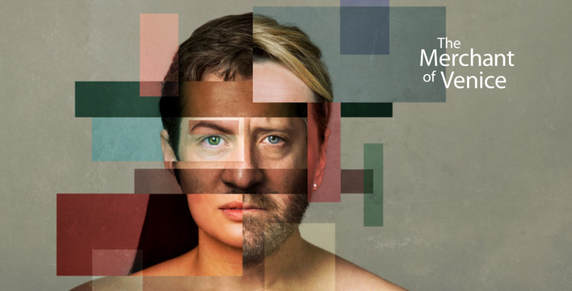Antonio takes the loan on behalf of his friend Bassanio so the latter might secure the love of the lady Portia. When Antonio’s ships are wrecked upon the rocks, and all fortunes lost, Shylock comes to collect and he is no mood to bargain.
After years of verbal abuse and commercial undermining Shylock is more than eager to collect his grim entitlement. To add insult to injury his beloved daughter has not only run off with a Christian man, and a bag of Shylock’s gold and treasured jewels, but renounced her faith and converted to Christianity.
Bassanio weds his wealthy lady and comes to Antonio’s rescue with double the ducats but Shylock compels the courts to support him in his right to extract his due. What ensues is a bloody battle of wits and the outcome is not pretty.
Director Nigel Shawn Williams sets his rendition of The Merchant of Venice in present-day Italy. Esthetically there is a lot to love about Williams’s choices, from Drew Facey’s gorgeous contemporary costumes and Marshall McMahen’s minimalist set scenic design, to Adrian Muir’s lighting and the dialogue-enhancing slow-motion movement of secondary characters in the scenes.
This is not an easy play to pull off and it is tricky, yet essential, to find the perfect balance when handling such extreme characters as Shylock and Antonio. In this play, more than ever, it is crucial to find some redeeming quality that will juxtapose the disdain, or on the flip side something spiteful to counter the love. Here is where the direction falls short.
Shylock is villainous for his insistence on fulfilling the terms of the bond, but he is nothing other than that throughout. There is no emotional connection established between he and his daughter that might show his vulnerability and love as a father or the depth of his loss when she elopes. If he doesn’t feel it, why should we? Nor is there any indication of the emotional affect the years of anti-Semitism have had on him. Instead Shylock is offered up as a vindictive and spiteful human being deserving of all that befalls him. Antonio, on the other hand, though a devout and unrepentant anti-Semite and insidious abrader of Shylock’s livelihood, is portrayed as heroic and just throughout and therefore unaccountable for his actions. How are we expected to side with a character that admits no fault and shows no humanity? And yet that is what is forced down our throats. These choices feel abrasive in their bias and resulting in an emotional disconnect from any of the characters.
While much of the dialogue felt forced and detached there were a few performances that carried well, most notably Warren Kimmel as the immoveable Shylock, Nadeen Phillip as the Prince of Morocco, and Paul Moniz de Sá as the prince of Aragon. Olivia Hutt does a fair turn as lady Portia but it is when she transforms to the doctor of civil law that she really shines. Her reading of the bond between Shylock and Antonio generates an almost palpable tension.
The utilization of movement on stage is clever and well orchestrated and allows the focus to remain on the key characters. Williams’s rendition is creative and bold and will undoubtedly morph as the actors settle into their characters. It is worth seeing, especially if you have seen a previous version of the play, to fully experience the scope of Williams’s vision.
The Merchant of Venice runs until September 16, 2017. Click HERE for information and tickets to the show.


 RSS Feed
RSS Feed
